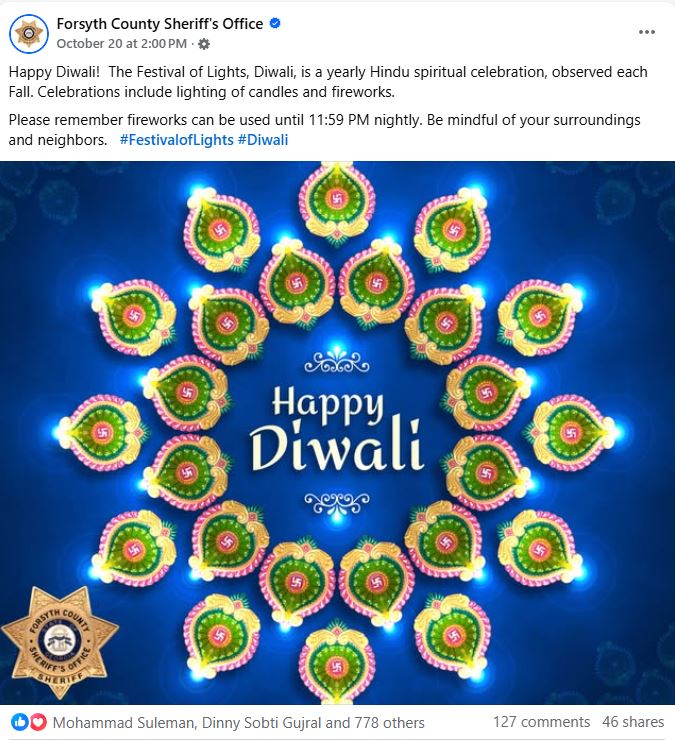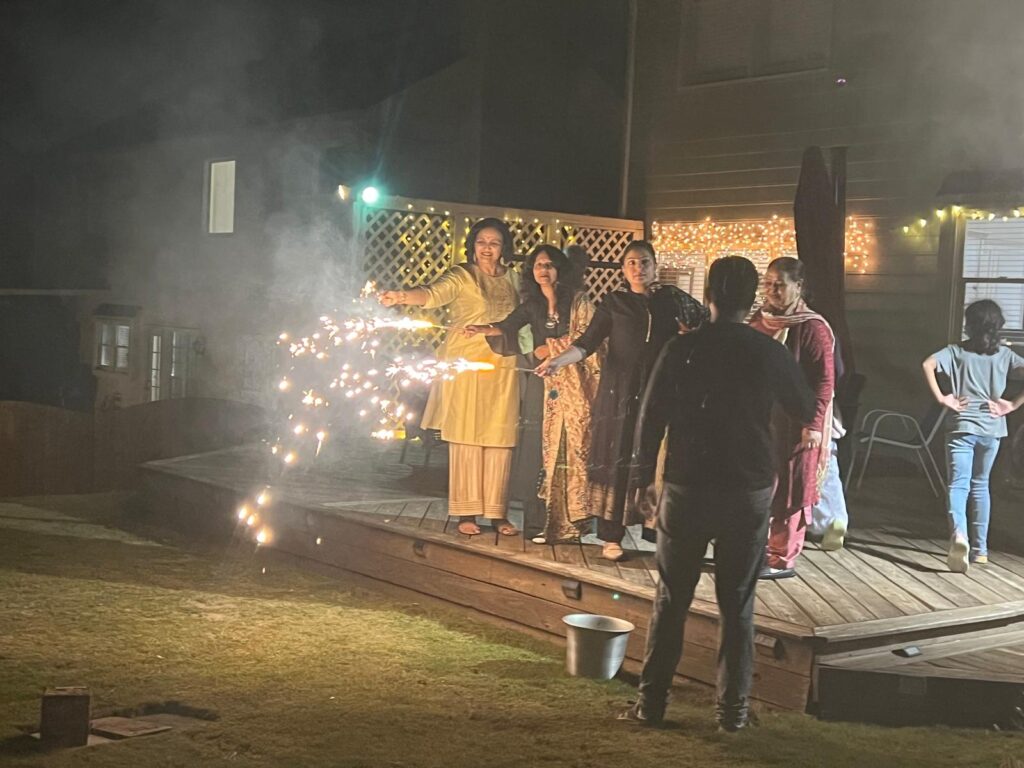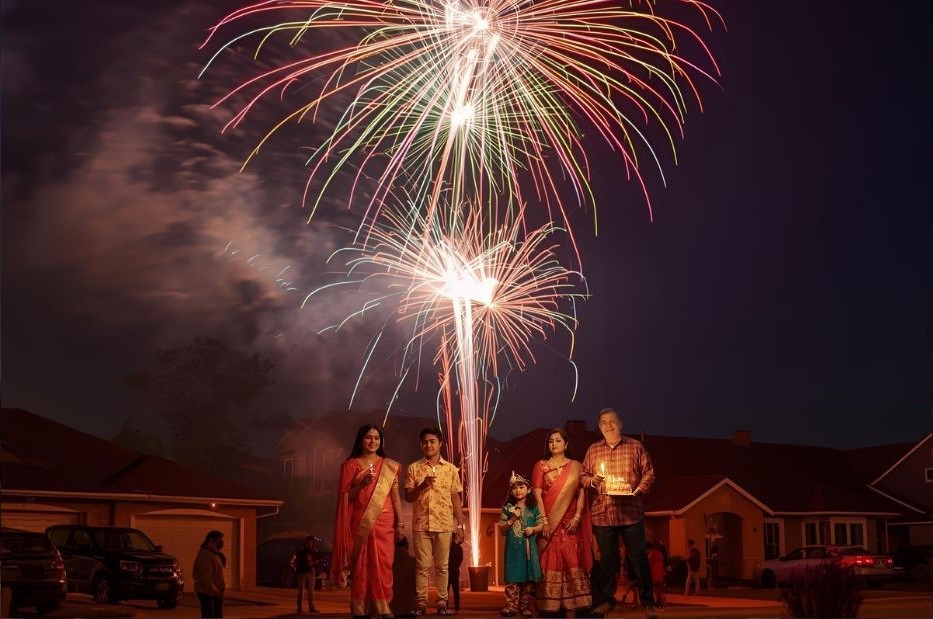BY VEENA RAO
Cumming, GA, October 23, 2025: As Forsyth County’s night skies erupted with the brilliance of Diwali fireworks this October, sparks also flew in several online community groups. Debates flared between those who took issue with the noisy disruptions that stretched late into the night and those who saw the fireworks as joyful expressions of culture. Interestingly, most of the voices in these discussions — both for and against the fireworks — came from non-Indian residents, while many Indian Americans chose to stay silent, mostly refraining from responding even when comments carried racial undertones or were openly hostile.
The county itself has officially embraced the festival. The Forsyth County Commission has recognized Diwali in recent years, and community celebrations at the Cumming City Center and local library branches have drawn hundreds. Under Georgia law, fireworks are permitted until 11:59 p.m., and the Forsyth County Sheriff’s Office this year posted a friendly message reminding residents to “be mindful of your surroundings and neighbors.”

Still, for some families, the nightly fireworks, often celebrated on the streets, was not a pleasant time. A post in a popular Forsyth neighborhood Facebook group summed up the frustration felt by some:
“🎃🎃 PSA 🎃🎃 Now that we’ve covered Diwali 🪔 and the multi-night display of fireworks, a quick reminder that trick-or-treating is on October 31st…as it has been since 1930ish. 👻”
Several commenters chimed in about the late-night booms and disrupted sleep. “I wish our county would put the noise ordinance at an earlier hour on a weekday,” wrote one resident. “Can’t we all agree we need to respect one’s need to sleep?”
Others, however, saw the complaints as intolerance. “If people exercising their right to express their beliefs is offensive to you and it’s being done within the limits of the law, they are not the problem. You are,” a veteran responded.
A third commenter took a sharper tone while responding to an Indian commentor: “I don’t know if you were born here or have immigrated here or are here on a visa. If you are here on a visa you are here as a guest of the US. If I were to move to India or work there, I’d abide by India’s customs and laws. It is highly recommended those immigrating here or visiting here adhere to US customs and laws.”
At least one member noted that several anti-Diwali posts had been deleted by group administrators, hinting at how heated the discussion had become.
In the Forsyth Local Facebook group, which has thousands of members, the administrators made their stance clear.
“REMINDER WE ARE NOT APPROVING FIREWORK COMPLAINTS… ESPECIALLY IF YOU WANT TO USE THAT KINDA OF LANGUAGE.
In Georgia, fireworks can be used legally on specific holidays, with restrictions on their use and sale to ensure safety and compliance with local regulations.
Legal Use: Fireworks can be ignited any day between 10 a.m. and 11:59 p.m., with extended hours on July 4th (until midnight) and New Year’s Eve (until 1 a.m.).”
Forsyth resident Veena Pothula, who has lived through these online debates for years, decided to take a different approach. Ahead of Diwali, she posted a message explaining the festival’s significance and asking for patience and understanding.
“As we prepare to celebrate Diwali, the Festival of Lights, from Oct 21st–Oct 28th (not all 7 days will be fireworks), we would like to share a gentle note regarding the tradition of fireworks,” she wrote. “Diwali holds deep cultural and spiritual significance, and fireworks are a cherished way of marking the occasion with joy and brightness.”
She acknowledged that many families — including Indian ones — have school-going children, pets, and veterans at home. “We do understand the importance of a heads-up,” she wrote. “Your cooperation will allow fellow Indian residents to celebrate peacefully while ensuring the joy of the festival is shared with all, the same way we respectfully support the Fourth of July and New Year.”
Her post received more than 500 reactions and dozens of comments, with residents — Indian and non-Indian alike — thanking her for her thoughtful tone.
But when the complaints persisted, Pothula addressed them head-on in another post directed to Georgia’s Indian community.
“Dear desi community in Georgia,” she wrote, “it’s disheartening to see so many racist complaints about Diwali fireworks every year.
The same people who joke about ‘student driver’ stickers on Teslas or crowded Costco lines often forget that it’s because of these very families that the local schools rank among the best — which, in turn, has helped raise their property values.
They forget that they are surrounded by highly educated, hard-working individuals who deeply value family, culture, and education. They are surrounded by a peaceful, law-abiding community that takes pride in their traditions and celebrates them with joy.”
While condemning racist remarks, Pothula also urged Indian Americans to be more considerate of their surroundings. “Give your neighborhoods advance notice about fireworks, avoid lighting them late at night over multiple days, and clean up afterward,” she wrote. “Speaking out against harassment, bullying, and racism is not a crime — but neither is being a good neighbor.”
Her message struck a chord with many, earning widespread support.

A long-time Cumming resident who did not want to be named said the situation was noticeably worse this year.
“We need to educate our folks,” the resident said. “There was more smoke and pollution than in the past this year. Especially in the newer desi neighborhoods — they started three or four days before Diwali and still continue. Forsyth County and probably North Fulton went a little overboard this year. Driving past some neighborhoods, there was so much smoke and pollution from fireworks, we could barely see the roads. Diwali can be celebrated in a much nicer way by not disturbing neighbors where kids and the elderly go to bed by 9 p.m.”
The resident urged the community to celebrate with more mindfulness:
“Wear nice clothes, hang out with friends, have Diwali parties, distribute sweets, increase awareness about Diwali among your neighbors, ask your senators to declare it a public holiday every year — but limit fireworks to one night and end them by 9 p.m. Don’t start at 10. Respect your neighbors, respect your environment.”
Forsyth County’s transformation over the past decade has been rapid. Nearly one in five residents now has South Asian roots. That diversity has enriched the county — but also brought new challenges in navigating cultural differences.
Across America, similar tensions surface each Diwali in neighborhoods with large Indian American populations. Fireworks spill onto streets, parking lots, and cul-de-sacs; nights get louder and longer; and the same debates unfold online — about noise, respect, and identity. Forsyth, in that sense, tells a national story about what it means to celebrate heritage while living shoulder-to-shoulder in multicultural suburbs.
Ultimately, it’s important for our community to speak up and respond to racist comments online, but also to take time to educate neighbors about Diwali — about the meaning of lights, the joy of gathering together to celebrate, and the fireworks. At the same time, we must be mindful of our neighbors, clean up afterward, and wrap up the celebrations by 9 p.m., even if the law allows until 11:59. Courtesy, after all, is the brightest light we can share.



